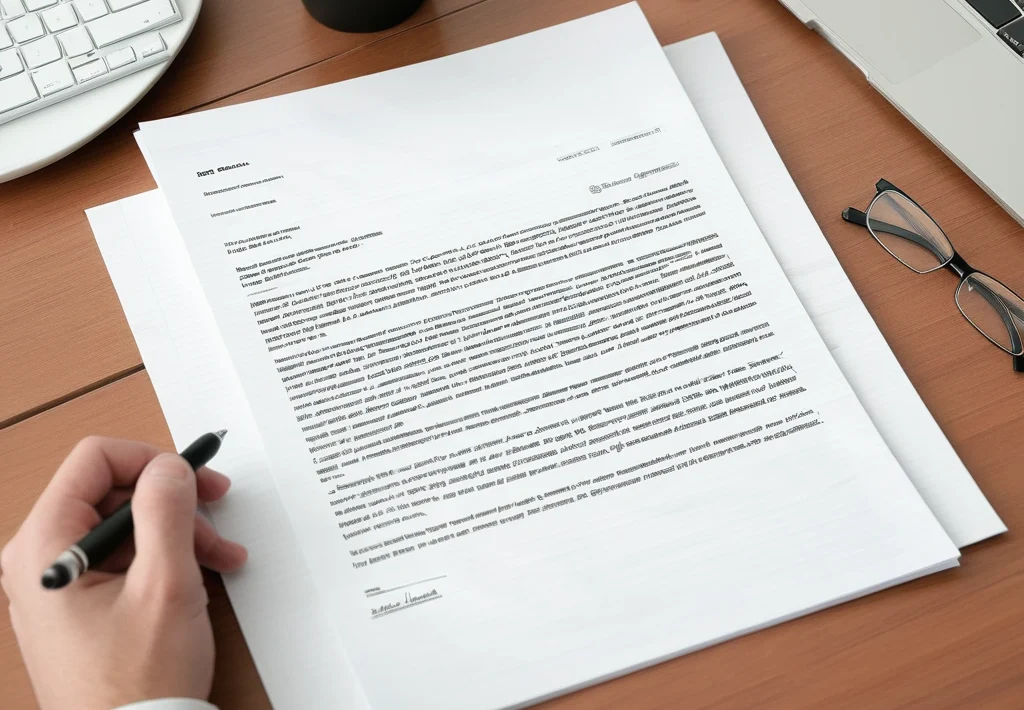In today’s competitive job market, where every position attracts numerous applicants, a well-crafted cover letter can be the key to unlocking new career opportunities. Job seekers often underestimate the power of a compelling application letter, but it serves as a crucial tool to introduce yourself, showcase your qualifications, and persuade potential employers to consider you for an interview.

Understanding the Application Letter
What is an Application Letter?
An application letter, commonly known as a cover letter, is a document submitted along with your resume to provide additional insights into your skills and experiences. It aims to explain why you are an ideal candidate for the job and demonstrate your genuine interest in the position and the organization.
According to Alison Doyle, a renowned career expert, an effective application letter should convey specific information about the job you are applying for, outline your qualifications, justify why you should be selected for an interview, and articulate your plans for follow-up.
Key Components of an Application Letter
To ensure your application letter is impactful, it should be organized into distinct sections:
- Heading: Include your name and contact information.
- Greeting: Address the letter to a specific person if possible.
- Introduction: Clearly state the purpose of your letter and mention the job title and company name.
- Body: Discuss your relevant qualifications, emphasizing what you bring to the employer.
- Closing: Express gratitude, provide contact information, and mention your plan for follow-up.
- Signature: Conclude the letter with your signature.
Tips for Writing a Standout Cover Letter
1. Start Directly and Strongly
In the first paragraph, clearly state why you are writing. Mention the job title, company name, and where you found the job listing. Keep it concise but impactful.
2. Offer Unique Insights
Go beyond your resume. Use the cover letter to provide a more personal touch, narrating your work experiences and career journey. Make it engaging and memorable.
3. Make a Persuasive Case
Remember, the primary goal is to secure an interview. Share details about your background and experience that make you an excellent fit for the position. Highlight how your previous roles have prepared you for this opportunity.
4. Close Effectively
End your letter with a thank-you note. Provide your contact information and specify how you will follow up. This demonstrates your eagerness and professionalism.
Sample Cover Letter Analysis
Let’s analyze a sample cover letter to understand these principles in action:
John Donaldson 8 Sue Circle Smithtown, CA 08067 909-555-5555 john.donaldson@email.com
September 6, 2022
George Gilhooley LTC Company 87 Delaware Road Hatfield, CA 08065
Dear Mr. Gilhooley,
In this example, John starts by clearly stating the purpose of his letter and the specific position he is applying for. He expresses his interest and encloses his certification, resume, and references.
John then makes a persuasive case by highlighting his key strengths and relevant qualifications. He provides specific examples of his achievements, such as designing and supporting live-use applications and delivering exceptional customer service.
The closing is effective, thanking the reader and expressing anticipation for further discussion. John includes his contact information and details about how he can be reached.
Email Cover Letter: A Modern Approach
In the digital age, many job applications are submitted via email. Here’s a sample email cover letter for reference:
Subject: Colleen Warren – Web Content Manager Position
Dear Hiring Manager,
This email cover letter by Colleen Warren adheres to similar principles. She expresses her interest in the position, emphasizes her experience in building content sites, and relates her business acumen to the social value of the sector.
Colleen uses the email signature to include her contact information, making it easy for the hiring manager to reach out.
How to Send an Email Application Letter
When sending a cover letter via email, it’s crucial to include your name and the job title in the subject line. Colleen’s example demonstrates this:
Subject: Colleen Warren – Web Content Manager Position
Include your contact information in the email signature, but exclude the employer’s contact details.
Things to Avoid
Crafting a compelling cover letter is essential for making a positive impression on potential employers. However, there are common pitfalls that job seekers should avoid to ensure their cover letters effectively communicate their qualifications and enthusiasm for the position. Here are some things to avoid when writing a cover letter:
- Generic Greetings:
- Avoid: Using generic greetings such as “To Whom It May Concern” or not addressing the hiring manager by name.
- Why: Personalizing your greeting shows that you’ve taken the time to research the company and the specific position. It also demonstrates a genuine interest in the opportunity.
- Overly Formal or Casual Tone:
- Avoid: Being overly formal or casual in your writing. Strive for a professional tone.
- Why: Your cover letter is a professional document, and striking the right tone is crucial. Avoid using overly complex language or being too informal, as it may not resonate well with the employer.
- Repeating Your Resume:
- Avoid: Simply rehashing your resume in paragraph form without adding value.
- Why: Your cover letter should complement your resume by providing context and insights into your experiences. Avoid redundancy and focus on elaborating on key achievements and skills.
- Lack of Customization:
- Avoid: Sending the same cover letter for multiple job applications without tailoring it to the specific position.
- Why: Customization is key. Each cover letter should be uniquely crafted to align with the job requirements, showcasing how your skills and experiences make you an ideal candidate.
- Vague Statements:
- Avoid: Using vague or generic statements without providing concrete examples or evidence.
- Why: Specific examples demonstrate your accomplishments and capabilities. Vague statements can make your cover letter less impactful and fail to differentiate you from other candidates.
- Negativity or Criticism:
- Avoid: Speaking negatively about past employers, experiences, or industries.
- Why: Positivity is crucial. Focus on your strengths and what you can bring to the new role rather than dwelling on negative aspects of your previous work experiences.
- Failure to Address Employment Gaps:
- Avoid: Ignoring or glossing over significant gaps in your employment history.
- Why: Be transparent about any employment gaps and use the opportunity to explain how you stayed relevant or developed skills during those periods.
- Excessive Length:
- Avoid: Writing a cover letter that is too long and detailed.
- Why: Hiring managers often have limited time to review application materials. Keep your cover letter concise and focused on key points to maintain the reader’s attention.
- Inappropriate Fonts or Formatting:
- Avoid: Using unprofessional fonts, colors, or formatting in your cover letter.
- Why: Stick to a clean and professional format. Unusual fonts or colors may distract from the content and make your cover letter less readable.
- Failure to Proofread:
- Avoid: Submitting a cover letter with grammatical errors or typos.
- Why: Typos and errors can create a negative impression and suggest a lack of attention to detail. Always proofread your cover letter carefully before submitting it.
Frequently Asked Questions (FAQs)
1. Do you have to write a cover letter when you apply for a job?
While some employers may not explicitly require a cover letter, it is often mentioned in job postings. Even when optional, a well-crafted cover letter can significantly boost your chances of securing an interview by showcasing your qualifications and enthusiasm for the position.
2. How can you use a cover letter to show you’re a qualified candidate?
To demonstrate your qualifications effectively, align your cover letter with the job requirements listed in the posting. Create a clear connection between your skills and experiences and the employer’s needs. Use the cover letter to provide a concise overview of your most relevant qualifications.
Conclusion
In conclusion, a meticulously crafted cover letter is a powerful tool in the job application process. By understanding the key components, following essential tips, and analyzing sample cover letters, you can create an application letter that sets you apart from the competition. Whether submitted through traditional mail or email, a compelling cover letter increases your chances of landing that coveted interview and, ultimately, the job.
